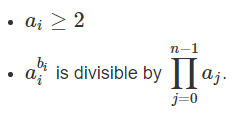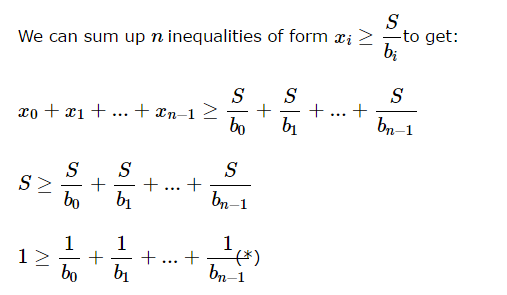Div2 Medium: DivisibleSetDiv2
Problem Statement
|
| |
You are given a vector <int> b containing a sequence of n positive integers: b[0], ..., b[n-1]. We are now looking for another sequence a[0], ..., a[n-1]. This sequence should have the following properties:
- Each a[i] should be a number of the form 2^x[i] where x[i] is some positive integer. In other words, each a[i] is one of the numbers 2, 4, 8, 16, ...
- For each i, the value a[i]^b[i] (that is, a[i] to the power b[i]) should be divisible by P, where P is the product of all a[i].
Determine whether there is at least one sequence with the desired properties. Return "Possible" (quotes for clarity) if such a sequence exists and "Impossible" otherwise. |
Definition
|
| |
| Class: |
DivisibleSetDiv2 |
| Method: |
isPossible |
| Parameters: |
vector <int> |
| Returns: |
string |
| Method signature: |
string isPossible(vector <int> b) |
| (be sure your method is public) |
|
Limits
|
| |
| Time limit (s): |
2.000 |
| Memory limit (MB): |
256 |
| Stack limit (MB): |
256 |
|
Constraints
|
| - |
b will contain between 1 and 50 elements, inclusive. |
| - |
Each element in b will be between 1 and 10, inclusive. |
Examples
|
| 0) |
|
| |
|
|
Returns: "Possible"
|
| One valid sequence is the sequence {2, 2}. That is, a[0] = a[1] = 2. Clearly, each a[i] is a power of two not smaller than 2. The product of all a[i] is 2*2 = 4. Both a[0]^b[0] = 2^3 = 8 and a[1]^b[1] = 2^2 = 4 are divisible by 4. |
|
|
| 1) |
|
| |
|
|
Returns: "Possible"
|
| Here, one valid sequence is {2, 2, 2}. |
|
|
| 2) |
|
| |
|
|
Returns: "Impossible"
|
| Suppose that a[0] = x and a[1] = y. The value a[0]^b[0] = x^1 should be divisible by x*y. This is only possible for y = 1. However, 1 is not a positive power of two, so we cannot have a[1] = 1. |
|
|
| 3) |
|
| |
|
|
Returns: "Possible"
|
| One valid sequence is {8, 4, 2}. |
|
|
| 4) |
|
| |
|
| 5) |
|
| |
|
| 6) |
|
| |
|
|
This is a mathematical problem which is very simple to implement but hard to prove. It turns out that the answer is "Possible" if and only if ∑i=0n−11bi≤1∑i=0n-11bi≤1. You can find a detailed proof below.
We are asked if there exists a sequence of powers of two (a0,a1,...,an−1)(a0,a1,...,an-1) that for every i:



Finally, we should avoid losing accuracy in order to use the perfect formula. Casuing the range of bi is [1, 10], we can multiply a constant C which equal to LCM(1,...,10).
public string isPossible(vector<int> b) {
int LCM = 2520, sum = 0;
for (int bi : b)
sum += LCM / bi; // sum up 1/b multiplied by LCM to avoid floats
return (sum <= LCM) ? "Possible" : "Impossible";
}
Recently, I had met two mathematical problems. The last one is hihoCoder_5 using log to get the maximum value.
____+++++____


